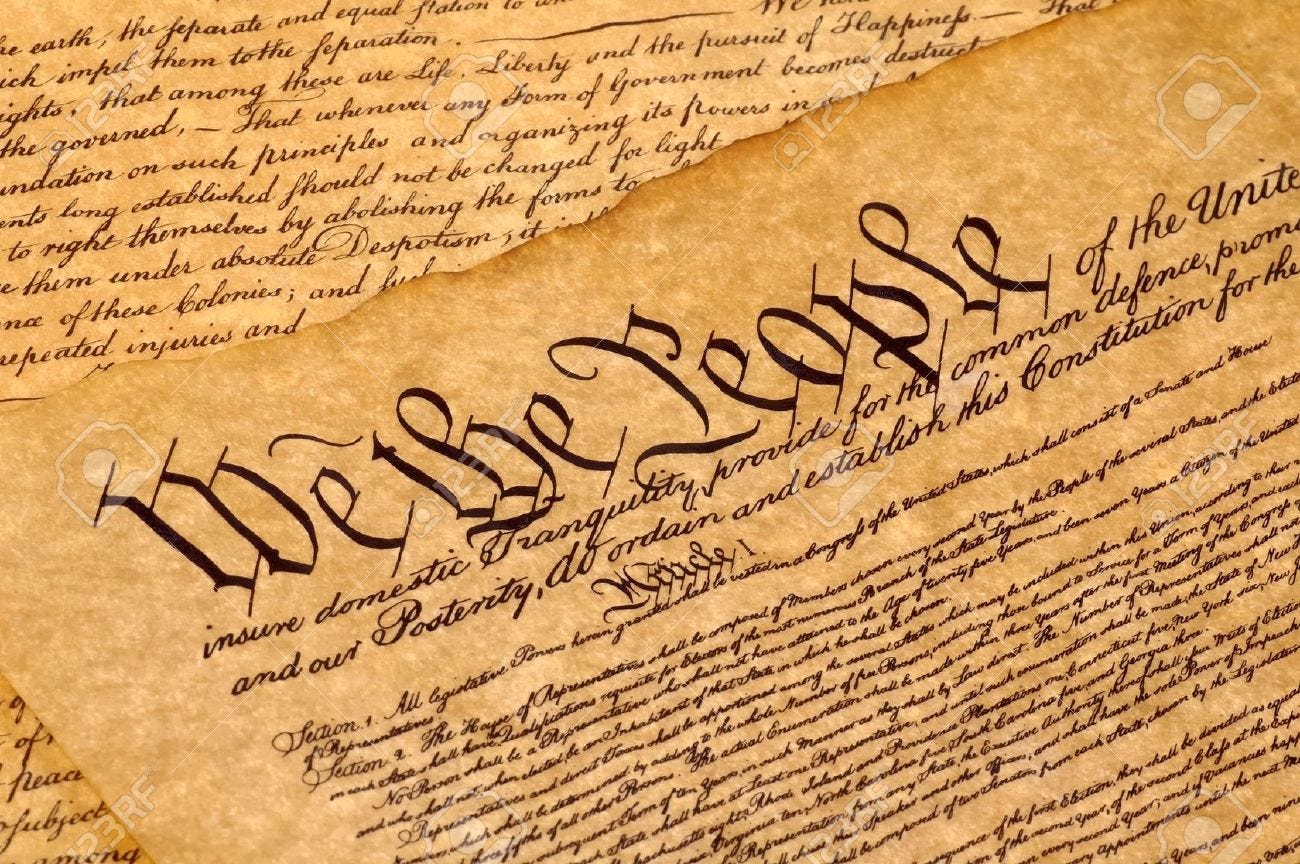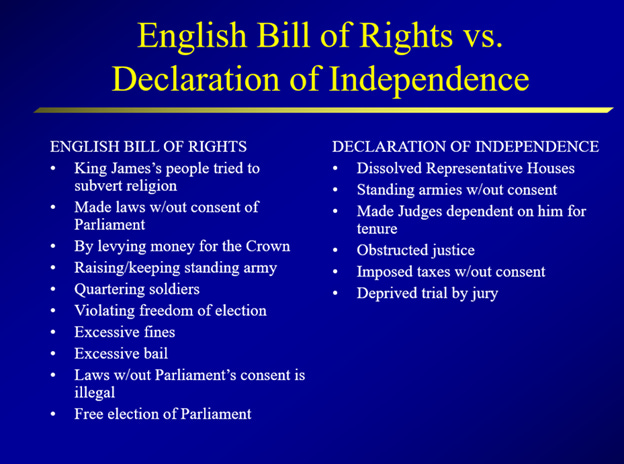One of the courses I loved teaching at the Naval Academy was American Government & Constitutional Development, particularly early in the semester where the midshipmen and I went through the underpinnings of the Declaration of Independence. We read it aloud and picked it apart. We did the same with the Constitution. In this way, the students had a basis for understanding the issues and debates that followed for more than two centuries as well as every module we covered through the semester.
The Declaration, with all due respect to Thomas Jefferson, was not an original document. While Jefferson’s document is a landmark in human history, it drew from more than two thousand years of evolutionary Western thoughts answering fundamental questions such as the nature of man, human rights, and governance.
What follows is a tale in two parts: first its structure and second its philosophical history.
The Declaration’s structure is simple:
- The first paragraph is the preamble – why this is being written
- The second and third paragraphs – the political philosophy on which this is based
- The bulk of the paragraphs – grievances against the King
- The last paragraph – the legal declaration of separation
The document was heavily influenced organizationally and substantively by the English Bill of Rights of 1689 after the Glorious Revolution. While it did not declare a separation, it did limit the powers of the monarchy. It did so by using words and phrases that would later be passed on to the Declaration of Independence - words like “rights,” “consent,” “nature,” and ideas such as the right to petition rulers without fear of punishment, self-governance, lawful taxation, distrust of standing armies during peacetime and that the monarch must act legally.
Here's a comparison of just a few of those:
English Bill of Rights:
“It is the right of the subjects to petition the king, and all commitments and prosecutions for such petitioning are illegal.”
Declaration of Independence:
“We have Petitioned for Redress in the most humble terms: Our repeated Petitions have been answered only by repeated injury.”
Bill of Rights
“Levying money for or to the use of the Crown by pretence [sic] of prerogative, without grant of Parliament… is illegal.”
Declaration
“He has imposed Taxes on us without our Consent.”
Bill of Rights
“The raising or keeping a standing army within the kingdom in time of peace, unless it be with consent of Parliament, is against law.”
Declaration
“He has kept among us, in times of peace, Standing Armies without the Consent of our legislatures.”
What of the philosophy Jefferson seemingly wrote out of thin air? It was due to his education and brilliant mind that he could frame the thoughts for this document. Here are those I covered in class and how they influenced the Declaration:
Plato: explored the idea that law must be grounded in moral principles - an idea that echoes in the Declaration’s invocation of the “Laws of Nature and of Nature’s God.”
Aristotle: provided one of the earliest conceptions of natural law - the belief that there are universal moral principles inherent in nature and discoverable by human reason. In his Nicomachean Ethics and Politics, Aristotle wrote of man as a "political animal" whose highest purpose was to live virtuously within a just society. Though Aristotle accepted hierarchical structures alien to modern democracy, his notion that certain laws were "according to nature" informed later theories about inherent rights and justice. The idea that laws exist beyond the will of kings or governments would become foundational to the American argument for independence.
Cicero: stated that natural law was above man-made law.
Stoic philosophers, especially Romans like Seneca and Marcus Aurelius, emphasized the dignity of the individual, self-governance through reason, and the idea that all people share a common humanity and moral law. These ideas supported the Declaration’s claim that “all men are created equal.”
Thomas Aquinas: synthesized Christian theology with Aristotelian philosophy in the 13th century and expanded the concept of natural law by grounding it in divine order. For Aquinas, natural law reflected God's eternal law, and humans, through reason, could discern right from wrong. This view held that unjust laws - those contrary to natural law - were not truly laws and did not require obedience. Such a claim echoes in the Declaration’s appeal to “the Laws of Nature and of Nature’s God,” legitimizing resistance to tyranny not as rebellion, but as a moral obligation.
Thomas Hobbes: offered a darker view of human nature. In Leviathan (1651), Hobbes argued that in the state of nature, life was “solitary, poor, nasty, brutish, and short.” He posited that nature had made men equal in their ability to kill or be killed, and that this equality bred mutual distrust. To escape this anarchy, men surrendered their rights to a sovereign power. While Hobbes championed absolute monarchy, his concept of equality and the social contract influenced later liberal theories, including those embraced by the American Founders - especially the idea that legitimate government arises to preserve life and security.
John Locke: more than any other philosopher, directly shaped the ideological core of the Declaration. In Two Treatises of Government (1689), Locke argued that all men are born with natural rights - life, liberty, and property (changed to “the pursuit of happiness”) - and that in the state of nature, they are free and equal. Government exists only by the consent of the governed, and when it fails to protect rights, the people have the right to alter or abolish it. Jefferson’s phrase “life, liberty, and the pursuit of happiness” is a Lockean paraphrase, and the entire structure of the Declaration echoes Locke’s arguments: the listing of grievances, the assertion of violated rights, and the ultimate justification for revolution.
Jean-Jacques Rousseau: in The Social Contract (1762), emphasized that legitimate political authority rests on a collective will - the “general will” - and that sovereignty resides with the people.
In combining these philosophical influences, the Declaration of Independence achieved something remarkable: it translated centuries of evolving thought into a clear, radical assertion of human equality, natural rights, and the right to self-government. From Aristotle’s moral order to Aquinas’s divine law, from Hobbes’s equality of vulnerability to Locke’s rights and consent, from Rousseau’s sovereignty of the people to Hume’s institutional realism, the document became both a product of its time and a timeless political manifesto.
The Declaration did not merely proclaim independence from a monarch - it asserted a new political philosophy rooted in universal principles. By grounding the rebellion in the language of reason, rights, and law, the American revolutionaries placed themselves within the grand tradition of classical philosophy and the Enlightenment and laid the foundation for a democratic experiment that continues to this day.
On this Fourth of July, take a few minutes to read it.
And thank you, Mr. Jefferson.






Excellent summation. I studied the above-mentioned political philosophers as a very callow undergraduate, and frankly, had a hard time understanding them through their incredibly dense prose. It has taken me years, with multiple revisits, to finally grasp their brilliance, as well as their place in the Enlightenment constellation, all of which informed men like Jefferson and his peers. It's been further study via an ancient fraternity's devotion to such studies that finally, in my near-dotage, that I begin to see the complex weave our Founders gifted us.
Thank you for this delightful summation.
This is absolutely terrific. I'll be crossposting it for my blog tomorrow (7/4) if you don't mind.